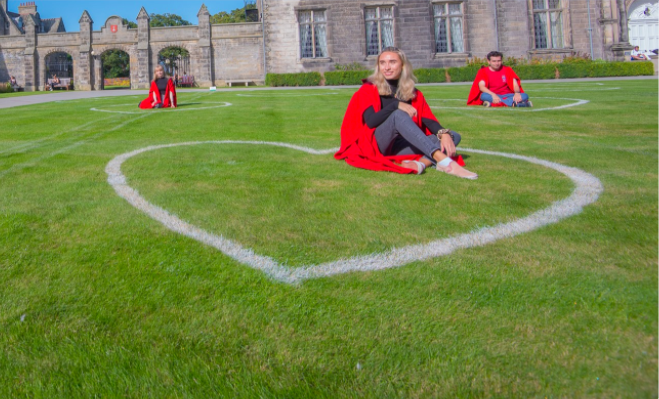Clare Collins ’23 | Alex Gobran ‘23
Universities all over the world are learning to cope with COVID-19 in order to maintain the health of their students and prevent the spread of the virus. EA alumni who are attending foreign universities provide insight into how various schools around the globe are dealing with COVID and offer thoughts surrounding how this has impacted their school year.

Photo courtesy of Izzy Handel ’20.
Tommy Lorenson ‘20 and Izzy Handal ‘20 attend the University of St. Andrews in Scotland. Handal summarizes a confusion felt by both of them, saying, “the entire experience is new and we don’t know anything else, so it is hard to know how much our college experience has been affected.” However, both Lorenson and Handal acknowledge the more obvious implications of the pandemic regarding social life and classroom environment, with the majority of class being virtual.
Scotland has a five tier system, which enforces various protocols and places restrictions on socializing, dining, and business hours depending on level of community risk. A higher tier means stricter restrictions because of rising COVID cases. Additionally, St. Andrews has put many guidelines of their own in place to prevent students from being infected. Lorenson notes that “despite St. Andrews doing really well with only around 22 cases, our fief, or county, is in tier three.” Handal states that students are mandated “to be in at most groups of six, outdoors, with no more than two households” and says, “I definitely think that we’re lucky because I feel like St. Andrews has handled it really well. If someone gets sick or has symptoms, then your household has to be isolated, which is a really good system because you shut yourself off from spreading it.” St. Andrews, unlike many colleges in the US, has yet to have a large outbreak, and Handal and Lorenson both agree that appropriate measures are being taken to ensure their safety both on and off campus.
St. Andrews also recognizes the need for socializing, which is why they have instituted many “Can-Do” activities such as “a Halloween decorating contest to see what building could decorate the best and which individual flats could decorate the best.” Lorenson makes the most of these organized events because, “all the little things, which seem insignificant–I don’t think I would typically go out of my way to do– make all the difference at this point in time.” Lorenson and Handal agree that COVID-19 has had a large impact on their first year of college, but nevertheless they are optimistic and enjoying their experience despite this challenging year.
Meanwhile, Glay Yang ‘20, a student at the University of British Columbia, remains at home rather than moving to Canada,noting, “I’m online in America for the whole school year so obviously it’s more difficult to make serious connections with the professors.” He feels that the pandemic and resulting virtual environment has been detrimental to his college experience and has had a negative influence on his freshman year. He notes the many rules, similar to those explained by Handel and Lorenson, that his university has put into place, including virtual (rather than in-person) learning, and for those who attend in person, mandatory mask-wearing with limited housing. He also notes that the University of British Columbia has also made some effort to make the year more enjoyable, saying “They’re trying to get students to sign up for coffee chats with professors and setting up game nights after exams.”
Lauren Bassett ‘20 will attend Williams College, but is taking a year to study abroad in Paris to study French at Education First, an international language school. She comments that “the virus definitely affected my experience because there’s just been a general feeling in the city that is a little bit more on edge than usual.” She recognizes that there is a change in the atmosphere due to the pandemic, but she feels like the city and her school have reacted well given the situation. Paris has been vigilant about requiring masks in public, and “there is a €100 fine” if anyone is seen without one around the city. Similar to St. Andrews, Bassett’s school in France has hosted a handful of out-of-school activities, such as French cooking classes, “to compensate for some of the limited opportunities in the city to make sure that we still had a good time.” Bassett has remained optimistic through it all since “there’s still a lot of positive experiences to be found. At the end of the day, just because a situation is a little bit different than usual, that doesn’t mean that it can’t still be really positive and meaningful.”